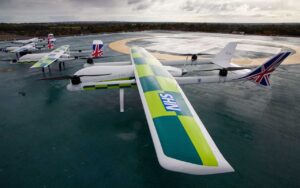Katy Perry goes into space! Should I buy this space tourism penny stock at $2?


Virgin Galactic (NYSE: SPCE) currently has a share price of $2 and a market-cap under $100m. This puts it squarely in penny stock territory. But it wasn’t always this way. Less than four years ago, shares of the space tourism start-up were skyrocketing like one of its spacecrafts.
Since those heady days in the summer of 2021 though, the share price has come back down to Earth with an almighty bump. It’s now 99.8% lower, wiping out around $13bn of market value in the process!
Singing among the stars
On 14 April, the first all-female group in more than 60 years went into space. The star-studded sextet included pop singer Katy Perry and Lauren Sanchez, the fiancée of Amazon founder Jeff Bezos. Perry became the first artist to sing in space.
Virgin Galactic has a backlog of over 700 paying customers, including a few celebrities. So why did these six get chosen by the space tourism pioneer? Well, it wasn’t actually Virgin Galactic that took them on the voyage at all. It was Blue Origin, the rocket and space exploration company founded by Bezos.
Indeed, Virgin Galactic hasn’t flown at all since last summer. It has paused operations to build a new fleet of spacecrafts (called Delta) that will carry six passengers rather than four. The new Delta class will also be able to fly twice weekly rather than once a month.
However, the next flight isn’t expected until summer 2026, with astronaut trips planned a few months after that.
Unique experience
Frustratingly, I have a mate who’s a flat-Earth theorist. I’d love to pay for him to go on one of these suborbital spaceflights so he can see the curve of the Earth with his own eyes. Every space tourist who’s been on one says it’s a truly unique and powerful experience.
Founded two decades ago by Sir Richard Branson, Virgin Galactic has a few successful flights under its belt. So we know its technology works and is capable of delivering a few minutes of weightlessness and a view of Earth for paying customers. Unfortunately though, each trip costs around $600,000 (£454,000) a customer, so me and my friend will go on debating for now.
Should I invest in Virgin Galactic?
The company essentially has no revenue coming in over the next 12-18 months. So the question is how much cash is on the balance sheet and whether that’s enough?
At the end of 2024, the firm had $657m in cash and equivalents. The net cash used for operating activities last year totalled $353m. However, I would assume that the cash burn will increase as it ramps up production of the new Delta class, which started being assembled last month. Therefore, it’ll be nip and tuck by the time next summer’s finished.
Further shareholder dilution seems certain. But with the share price so low, that might not be enough. The company also carries around $420m in convertible debt, set to mature in early 2027.
Global supply chain problems must also be a headache as it enters production. Finally, the recent celebrity voyage highlights how formidable the competition is, from both Blue Origin and Elon Musk’s SpaceX.
Weighing things up, the stock’s far too risky for me.
The post Katy Perry goes into space! Should I buy this space tourism penny stock at $2? appeared first on The Motley Fool UK.
Investing in AI: 3 Stocks with Huge Potential!
🤖 Are you fascinated by the potential of AI? 🤖
Imagine investing in cutting-edge technology just once, then watching as it evolves and grows, transforming industries and potentially even yielding substantial returns.
If the idea of being part of the AI revolution excites you, along with the prospect of significant potential gains on your initial investment…
Then you won’t want to miss this special report inside Motley Fool Share Advisor – ‘AI Front Runners: 3 Surprising Stocks Riding The AI Wave’!
And today, we’re giving you exclusive access to ONE of these top AI stock picks, absolutely free!
More reading
- Prediction: 10 years from now, £5,000 invested in a SIPP could be worth…
- 3 under-the-radar UK shares that could make investors richer
- How I’d invest £500 using 3 lessons from billionaire Warren Buffett
- Start building lifelong passive income in 2025 with just £5 a day
- Recently released: April’s higher-risk, high-reward stock recommendation [PREMIUM PICKS]
John Mackey, former CEO of Whole Foods Market, an Amazon subsidiary, is a member of The Motley Fool’s board of directors. Ben McPoland has no position in any of the shares mentioned. The Motley Fool UK has recommended Amazon. Views expressed on the companies mentioned in this article are those of the writer and therefore may differ from the official recommendations we make in our subscription services such as Share Advisor, Hidden Winners and Pro. Here at The Motley Fool we believe that considering a diverse range of insights makes us better investors.






